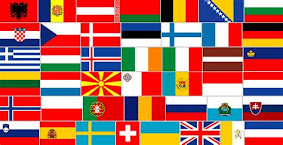by Derek Turner
On 14 April, Hungarian electors rejected the Socialist government which had been in office since 2002, voting instead overwhelmingly for the conservative Fidesz party led by Viktor Orban (who was prime minister 1998-2002) and the nationalist Jobbik, led by Gabor Vona. The final allocation of seats will only be made after the second round on 25 April, but these results indicate that Fidesz will have 206 seats in the 386 seat parliament and Jobbik 26 (the Socialists will probably have just 28).
The result was greeted with much international panic because Jobbik (short for Jobbik Magyarországért Mozgalom, which translates as "Movement for a Better Hungary") with around 17 percent of the vote, will be represented for the first time in the handsome 1902 Parliament building on the Pest bank of the Danube. The reason this is a problem for some is that Jobbik is often accused of espousing "far right," "anti-Semitic" and "anti-gypsy" sentiments.
In 1999, Hungary joined NATO; in 2004, it joined the EU, since which, it has been run by a duopoly of Communists-turned-free-traders and technocratic "conservatives."
Jobbik was founded in 2003, growing out of a congeries of Catholic and Protestant student groups inspired by Christianity and a strong sense of national exceptionalism.
At the general election of 2006, they campaigned on an anti-EU, anti-globalism, anti-crime ticket in conjunction with two other parties, the Justice and Life Party (MIÉP) and the vestigial Independent Smallholders' Party (FKgP), but scored only 2.2 percent. Jobbik members were involved in the mass anti-government protests of 2006 in which 800 people were injured and large-scale disturbances the following year, and received an undue percentage of the blame, with the demonstrators being dubbed "a fascist rabble" by some media.
Jobbik's breakthrough came in last year's European elections, when they attracted just under 15 percent of the vote and had three MEPs elected, despite having their "Hungary for the Hungarians" slogan declared "unconstitutional" on the eve of polling day. They have since scored similar percentages in regional and municipal contests.
The party's leaders are respectable figures -- teachers, businessmen, 1956 veterans and lawyers, including Dr. Krisztina Morvai, one of the party's MEPs, who is a Fulbright scholar and probably Hungary's leading advocate of human rights. Jobbik's manifesto is moderate in tone (an English language version can be downloaded from www.jobbik.com, and much of its content would not look out of place in a Christian Democrat manifesto. And since Vona took over as party leader, the party has sought cooperation with Fidesz where possible.
Where Jobbik begins to diverge from the mainstream is in its belief in a "Europe of the nations," its distrust of free trade, its insistence that it would forbid civil partnerships, abolish the "Liberal-cultural dictatorship" and seek to reunify the "Hungarian nation unjustly torn apart." It has also become famous for its opposition to crime by gypsies (gypsies constitute 5-7 percent of the Hungarian population, but commit a disproportionate number of crimes), and it seeks to set up a special police unit to deal with what is a severe problem in some areas. They take pains to point out that not all gypsies are to blame and that many victims of gypsy crime are other gypsies. But Vona's pledge on 12 April that the party would "eradicate" gypsy crime, and his pledge that Jobbik would not be carrying out "peaceful" politics, have fed the Left's deepest fears.
The widespread allegations of anti-Semitism seem to stem mostly from a scatological internet comment posted just before last year's Euro-elections, purporting to emanate from Krisztina Morvai (who has been a vociferous defender of Palestinian rights since working there with the UN), but which she strongly denies having made. Given her social class, and the fact that she had three children by a Jewish man, it seems reasonable to give her the benefit of the doubt. Other anti-Semitic quotes ascribed to Jobbik members sound equally improbable -- although obviously vicious anti-Semitism does exist in eastern Europe.
Jobbik has a working relationship with other European nationalist groups, such as the BNP, the Front National, the Belgian Front National, the Swedish National Democrats and the Italian Fiamma Tricolore -- but is unwilling to ally itself with comparable Romanian, Czech and Slovak groups, who lay claim to some of the same territories desired by Jobbik's ideologues, and often on equally good historical grounds. This is the perennial dilemma of the "Europe of nations" concept so beloved of many European right-wingers and conservatives. Sooner or later, Europeans who wish to preserve European civilization will have to learn to live down their history.
What really gives credence to some of the dark rumours about Jobbik is the Magyar Guard, a uniformed organization set up by the party in 2007 for the purpose of "strengthening national self-defense and maintain public order" -- a move that divided even the party, with three senior members walking out. Widely suspected of being a militia, and implicated (who knows with what justification?) in street violence, it was banned in July 2009. It has since tried to reconstitute itself as a cultural organization, the Magyar Guard Foundation, but will probably be banned again.
Gabor Vona has promised to wear the banned uniform at the opening of the new session of parliament. Such activities merely revive unhappy memories and reinforce unfortunate stereotypes. Jobbik would be well-advised to disband the group altogether and save themselves a lot of trouble.
If they do this, if they can work out a modus vivendi with neighboring nationalists, and if they can work tactically with Fidesz without compromising their principles, then the future could hold great things for Jobbik.
The result was greeted with much international panic because Jobbik (short for Jobbik Magyarországért Mozgalom, which translates as "Movement for a Better Hungary") with around 17 percent of the vote, will be represented for the first time in the handsome 1902 Parliament building on the Pest bank of the Danube. The reason this is a problem for some is that Jobbik is often accused of espousing "far right," "anti-Semitic" and "anti-gypsy" sentiments.
In 1999, Hungary joined NATO; in 2004, it joined the EU, since which, it has been run by a duopoly of Communists-turned-free-traders and technocratic "conservatives."
Jobbik was founded in 2003, growing out of a congeries of Catholic and Protestant student groups inspired by Christianity and a strong sense of national exceptionalism.
At the general election of 2006, they campaigned on an anti-EU, anti-globalism, anti-crime ticket in conjunction with two other parties, the Justice and Life Party (MIÉP) and the vestigial Independent Smallholders' Party (FKgP), but scored only 2.2 percent. Jobbik members were involved in the mass anti-government protests of 2006 in which 800 people were injured and large-scale disturbances the following year, and received an undue percentage of the blame, with the demonstrators being dubbed "a fascist rabble" by some media.
Jobbik's breakthrough came in last year's European elections, when they attracted just under 15 percent of the vote and had three MEPs elected, despite having their "Hungary for the Hungarians" slogan declared "unconstitutional" on the eve of polling day. They have since scored similar percentages in regional and municipal contests.
The party's leaders are respectable figures -- teachers, businessmen, 1956 veterans and lawyers, including Dr. Krisztina Morvai, one of the party's MEPs, who is a Fulbright scholar and probably Hungary's leading advocate of human rights. Jobbik's manifesto is moderate in tone (an English language version can be downloaded from www.jobbik.com, and much of its content would not look out of place in a Christian Democrat manifesto. And since Vona took over as party leader, the party has sought cooperation with Fidesz where possible.
Where Jobbik begins to diverge from the mainstream is in its belief in a "Europe of the nations," its distrust of free trade, its insistence that it would forbid civil partnerships, abolish the "Liberal-cultural dictatorship" and seek to reunify the "Hungarian nation unjustly torn apart." It has also become famous for its opposition to crime by gypsies (gypsies constitute 5-7 percent of the Hungarian population, but commit a disproportionate number of crimes), and it seeks to set up a special police unit to deal with what is a severe problem in some areas. They take pains to point out that not all gypsies are to blame and that many victims of gypsy crime are other gypsies. But Vona's pledge on 12 April that the party would "eradicate" gypsy crime, and his pledge that Jobbik would not be carrying out "peaceful" politics, have fed the Left's deepest fears.
The widespread allegations of anti-Semitism seem to stem mostly from a scatological internet comment posted just before last year's Euro-elections, purporting to emanate from Krisztina Morvai (who has been a vociferous defender of Palestinian rights since working there with the UN), but which she strongly denies having made. Given her social class, and the fact that she had three children by a Jewish man, it seems reasonable to give her the benefit of the doubt. Other anti-Semitic quotes ascribed to Jobbik members sound equally improbable -- although obviously vicious anti-Semitism does exist in eastern Europe.
Jobbik has a working relationship with other European nationalist groups, such as the BNP, the Front National, the Belgian Front National, the Swedish National Democrats and the Italian Fiamma Tricolore -- but is unwilling to ally itself with comparable Romanian, Czech and Slovak groups, who lay claim to some of the same territories desired by Jobbik's ideologues, and often on equally good historical grounds. This is the perennial dilemma of the "Europe of nations" concept so beloved of many European right-wingers and conservatives. Sooner or later, Europeans who wish to preserve European civilization will have to learn to live down their history.
What really gives credence to some of the dark rumours about Jobbik is the Magyar Guard, a uniformed organization set up by the party in 2007 for the purpose of "strengthening national self-defense and maintain public order" -- a move that divided even the party, with three senior members walking out. Widely suspected of being a militia, and implicated (who knows with what justification?) in street violence, it was banned in July 2009. It has since tried to reconstitute itself as a cultural organization, the Magyar Guard Foundation, but will probably be banned again.
Gabor Vona has promised to wear the banned uniform at the opening of the new session of parliament. Such activities merely revive unhappy memories and reinforce unfortunate stereotypes. Jobbik would be well-advised to disband the group altogether and save themselves a lot of trouble.
If they do this, if they can work out a modus vivendi with neighboring nationalists, and if they can work tactically with Fidesz without compromising their principles, then the future could hold great things for Jobbik.




























No comments:
Post a Comment
Your comment will appear after it has been checked for spam, trolling, and hate speech.